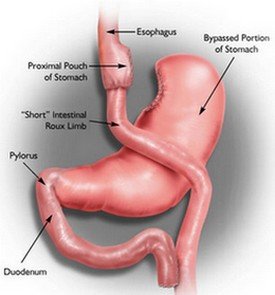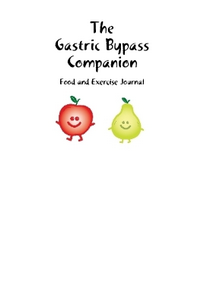|
Gastric Bypass Surgery |
Considering weight loss surgery?
 |
RNY:
- Makes the stomach smaller by dividing it into two compartments
- Bypasses some of the small intestines in order to cause malabsorption
I'll spare you my attempt at describing the nitty gritty details of how it's done, and suggest you see this description and animation of the Roux-en-Y surgery from one of the docs I work with!
I will, however, share my viewpoint and concerns as a dietitian.
(Had weight loss surgery? Tell us about it!)
Translation...
...you can't eat very much at one time!
The good news it that you shouldn't feel physically hungry. The hormone that causes you to feel physical hunger is "turned off" by the surgery...
...for about a year on average. I have, however worked with patients who claim to feel no hunger for as long as two years and some who feel hungry in less than a year.
The surgery doesn't affect head hunger or "appetite" (the desire to eat) so don't expect "cravings" to magically disappear.
The down side of not being able to eat very much at one time is that you can easily wind up with low blood sugar.
Low Blood Sugar
Food is fuel! Fuel helps you think and move. Symptoms of low blood sugar such as fatigue, difficulty concentrating, and low energy are common complaints that can often be attributed to low blood sugar.
Good news again...
...Low blood sugar can be prevented by eating small, balanced meals (not just protein, protein, protein to the exclusion of other foods) at regular, planned intervals (every 2-4 hours).
If you're considering Roux-en-Y, I'd highly suggest getting into the habit of eating small frequent meals NOW, so it's not a drastic adjustment later.
Nutrient Deficiencies with Roux-en-Y
My other HUGE concern, is that of nutrient deficiencies. The portion of the small intestine that's bypassed is responsible for absorption of important nutrients such as calcium, iron and B12. Without proper amounts of these nutrients, health can fail in other ways (anemia, osteoporosis, etc.)
You don't want to get rid of one health problem (excess weight) for a new one (like osteoporosis)!
Lifelong vitamin/mineral supplementation is therefore necessary with a Roux-en-Y procedure as well as lifelong follow up with your doctor in order to have your blood levels regularly monitored.
A study published in the May '08 issue of the American Journal of Clinical Nutrition concluded that basic multivitamins are not effective at preventing deficiencies in gastric bypass patients.Gastric bypass patients have special needs and should therefore take vitamins formulated to those special needs. It just makes sense...bariatric patients should take bariatric vitamins!
If you're not good at "remembering" to take vitamins, you better get good at it real quick, or think twice about this malabsorptive type of bariatric surgery.
No discussion of gastric bypass surgery would be complete without mention of dumping syndrome. That's the "negative reinforcement" you'll get from eating sugar after surgery.
Many of my patients have confessed they wanted to have the Roux-en-Y for this exact reason! Being "sugar addicts," many have admitted to desiring the negative reinforcement of dumping syndrome in order to keep them out of the cookie jar.
But once again keep in mind that weight loss surgery is no magic bullet.
Many of those who thought that getting sick from eating sugar would make them stop...
...haven't stopped.
Read experiences of people who have had weight loss surgery.
Also, over time, you may be able to tolerate small amounts of sugar without consequence and that can eventually lead to gaining weight back.
Low Calorie Diet
After gastric bypass surgery, you'll be following a low calorie, low carbohydrate, high protein diet for life. Generally 800-1000 calories/day is recommended, although guidelines will vary based on your surgeon and/or dietitian.
Here's MY gastric bypass food guide pyramid that I developed to use with my patients. (You'll need Adobe to open it).
I suggest having 5-6 small meals per day. Each meal should include 2 oz. protein (or the equivalent) plus 1 serving of fruit, vegetable or starch (starch only twice/day). One serving of fat can also be included with most meals.
Here's an example of what that means:
Sample Roux-en-Y Menu
 |
Breakfast:
Protein shake: Blend 4oz water + 1 scoop protein powder (at least 14g protein) + 1/2 cup frozen berries + 1 Tbsp. ground flaxseeds
A.M. Snack:
1/2 cup lowfat ricotta cheese + 1/2 cup unsweetened applesauce. Sprinkle with apple pie spice or pumpkin pie spice (yummy!)
Lunch:
Omelet:
Saute 1/2 cup veggies (ex: asparagus or spinach) in 1 tsp. oil. Pour 1 egg + 2 egg whites over veggies and cook until eggs start to set. Flip and cook until golden on both sides. Serve with a spoon of salsa on top if desired.
Afternoon Snack:
Lettuce wrap: 1oz turkey + 1 oz cheese + 2 Tbsp. guacamole + sliced tomato all rolled up together in a romaine lettuce leaf
Dinner:
2oz chicken
3oz baked sweet potato + 1 tsp. butter
Evening snack:
1 serving of a carbohydrate "treat" of choice. Ex: 1 slice cinnamon raisin toast
For more help with menu planning and menu suggestions, you can contact me for a private consultation!
More weight loss surgery.





